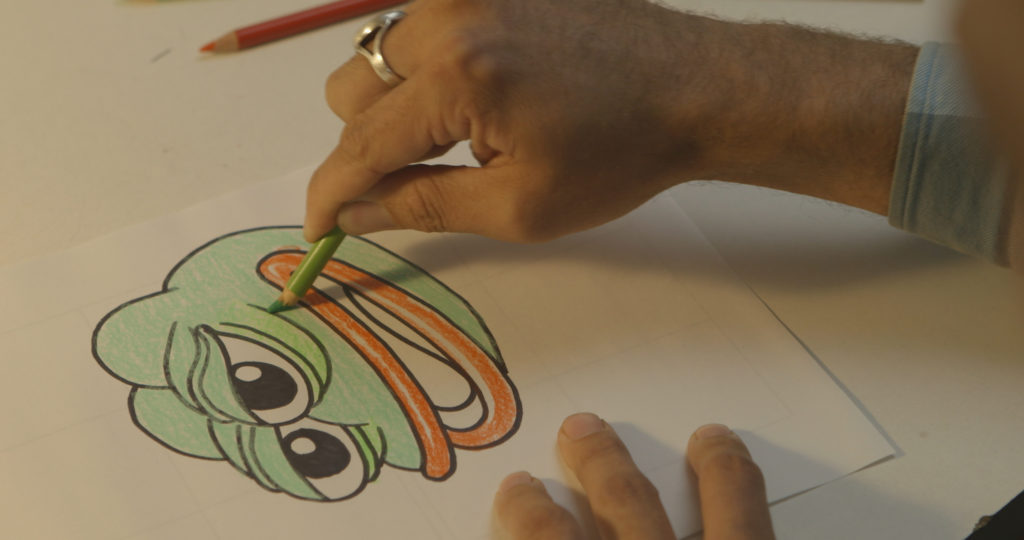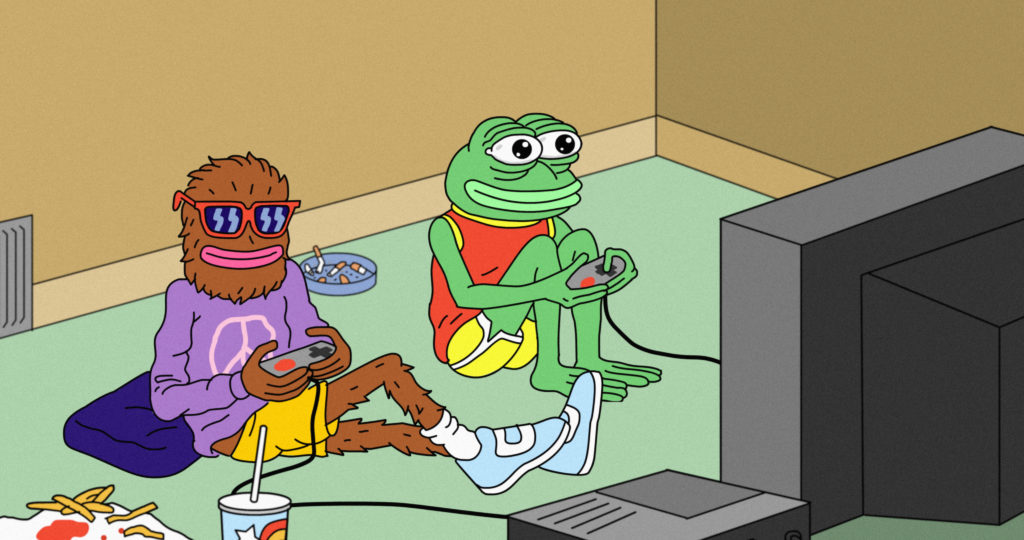
With all due respect to Host, I have just seen the scariest movie of the year.
If you’ve been on the internet in the past several years– or even if you’ve just lived on the planet which happens to house the internet– you’ve likely encountered Pepe, the grinning, crudely-drawn frog who has become a sort of shorthand for a certain breed of smug, nihilistic cyber-troll. What you might not know, or have even thought of, is his origin. Many moons ago, Pepe the Frog was the brainchild of Matt Furie, a laid-back San Francisco cartoonist who couldn’t be much more different from the legions who have appropriated his work. Pepe began his life as a character in Boy’s Club, Furie’s self-published series of alt-comix following a group of anthropomorphic animals who like to hang out, get stoned, and party (like many underground comic books, it seems to be at least semi-autobiographical). In one installment of the series, Pepe’s roommate inadvertently walks in on Pepe peeing in the toilet with his pants pulled all the way down. When confronted about it later, Pepe shrugs and offers, “Feels good, man.” Tickled by how the sequence came out, Furie scanned the page, posted it on his MySpace (simpler times!), and largely forgot about it.
Pepe’s journey from this mellow, relatable comic panel to the ADL’s registry of hate symbols is a dizzying one, and the subject of Feels Good Man, the electrifying new documentary by the filmmaking team of Arthur Jones and Giorgio Angelini. As is so often the case with meme culture, the spread was lightning fast and, at some junctures, muddled (I’m reminded of the Wikipedia article for the Harlem Shake, which was at one point measured in hours). From Furie’s original MySpace post, the panel was somehow seized upon by the online bodybuilding community, who adopted “Feels good, man” as shorthand for a good workout. From there, Pepe migrated to the untamed wilderness of 4chan, where a version of the panel, altered to make Pepe cry, became a self-pitying symbol of the incel movement. Through means unclear, Pepe was then discovered by beauty Youtubers, who began crafting tutorials to cover one’s face in green, Pepe-inspired makeup (look, I’m just reporting the facts here). This filtered back to the incels, furious that their icon had been “hijacked by normies” (or, in the horrifying words of one interviewed 4channer, “sex-havers and women”). To fight back, 4chan began flooding the internet with the most deliberately awful images of Pepe they could cook up: Pepe flying into the World Trade Center, Pepe manning the gas chambers at Auschwitz, and so forth. This being the internet, it wasn’t long before any traces of irony evaporated, and these images became a sort of internal language of the alt-right (or, as you might know them, “fucking nazis”). Then Trump happened, and the internet, prone as always to disappearing up its own ass, interpreted his glibly confrontational style as an extension of Pepe Culture– and, given the porous nature of Trump’s own reality, who’s to say he isn’t?
If you didn’t follow all that, I don’t blame you. Perhaps Jones and Angelini’s greatest accomplishment is chronicling Pepe’s journey in a way that feels as linear as it could possibly be, supplemented with commentary from cultural observers, social psychologists, and even one particularly colorful occultist on the nature of “meme magick” (there are also a couple of interviews with bitcoin millionaires who have spent thousands of dollars on “rare Pepe” images, a phenomenon I can’t even begin to pretend to understand well enough to describe). The internet is a deeply weird place, filled with sub-subcultures which have long since evolved beyond anything recognizable to an outside observer. To probably as great an extent as possible, the filmmakers illustrate this phenomenon in a way that is both imminently accessible and darkly hilarious. Anyone who has browsed through a comment section or stumbled into a bad part of Twitter has likely seen evidence of the events on display; Jones and Angelini take their camera crew on board a metaphorical submarine to show us just how deep the iceberg extends.

Watching Feels Good Man, I was comforted to recognize more of myself and my social circles in Furie and his friends than in the web-creatures who seized upon his work, and I suspect many Hassle readers will feel the same. Furie’s crowd consists largely of artsy weirdos, tattooed and stringy-haired, hanging out in thrift shops and record stores and drawing funny cartoons to make each other laugh. Yet with this identification came what was, to me, the most chilling aspect of the film. Furie comes across as a genuinely goodhearted soul, comfortable in his weird little world, whose greatest aspiration is to be a children’s book illustrator. When he first became aware that Pepe had become a meme, he mostly laughed about it, amused at the bizarre turn his life had taken (“This would only happen to you!” one of his friends jokes). It isn’t until too late that he realizes how dark things have gotten, and it isn’t until the genie is long since out of the bottle that the reality forces him to try to take action to try to stop it. These moments made my blood run cold, because I know, in my heart of hearts, that I would have reacted in the exact same way if something like this had happened to me– and due to the random nature of online culture, it’s impossible to predict when or where that might happen. The internet is a gaping maw filled with a million teeth; lighthearted weirdos don’t stand a chance.
Perhaps strangely, the most visually dazzling aspect of Feels Good Man is also its most touching. Jones is himself a cartoonist and animator, and he makes the inspired decision to create animated versions of Pepe and his Boy’s Club friends as a throughline for the film. These scenes feel like a glimpse into an alternate timeline, in which none of this awful shit happened and Furie was allowed to bring his creations to life as an Adult Swim show. It’s a reminder that, while Pepe is a silly meme (or sinister hate symbol) to most people, to his creator he’s an actual character, into whom he spent years breathing life. By the end of the film, Jones succeeds in making you feel for the character on his own terms; when he animates Pepe’s funeral, set to a mournful Daniel Johnston tune, you may even find a lump in your throat.
In the coming years, there’s going to be a lot– like a lot a lot– of films trying to unpack the Trump years (I will bet you dollars to donuts one is going to be titled Unpresidented, very possibly directed by Adam McKay). Most of these will likely focus on the man himself, and on his rogue’s gallery of an administration, and on the chaos they’ve wrought with which we’ll likely be reckoning for decades. But Feels Good Man may be the most vital snapshot of this deeply strange moment in history, in which monumental decisions are influenced, however circuitously, by chaotic, neckbearded shitposters. It also serves as a reminder of the toll that online hysteria can take on an innocent bystander, and even gives a glimmer of hope that they may be able to pick at least some of the pieces. I don’t know if it feels GOOD, but there’s not much else like it, man.
Feels Good Man
2020
dir. Arthur Jones
93 min.
Available for digital rental Friday, 9/4
Limited virtual “preview screenings” via the Brattle Friday, 8/28 & Saturday, 8/29, followed by live Q&A!
Part of the Fantasia International Film Festival – to follow our continuing coverage click here!
Streaming is no substitute for taking in a screening at a locally owned cinema, and right now Boston’s most beloved theaters need your help to survive. If you have the means, the Hassle strongly recommends making a donation, purchasing a gift card, or becoming a member at the Brattle Theatre, Coolidge Corner Theatre, and/or the Somerville Theatre. Keep film alive, y’all.

